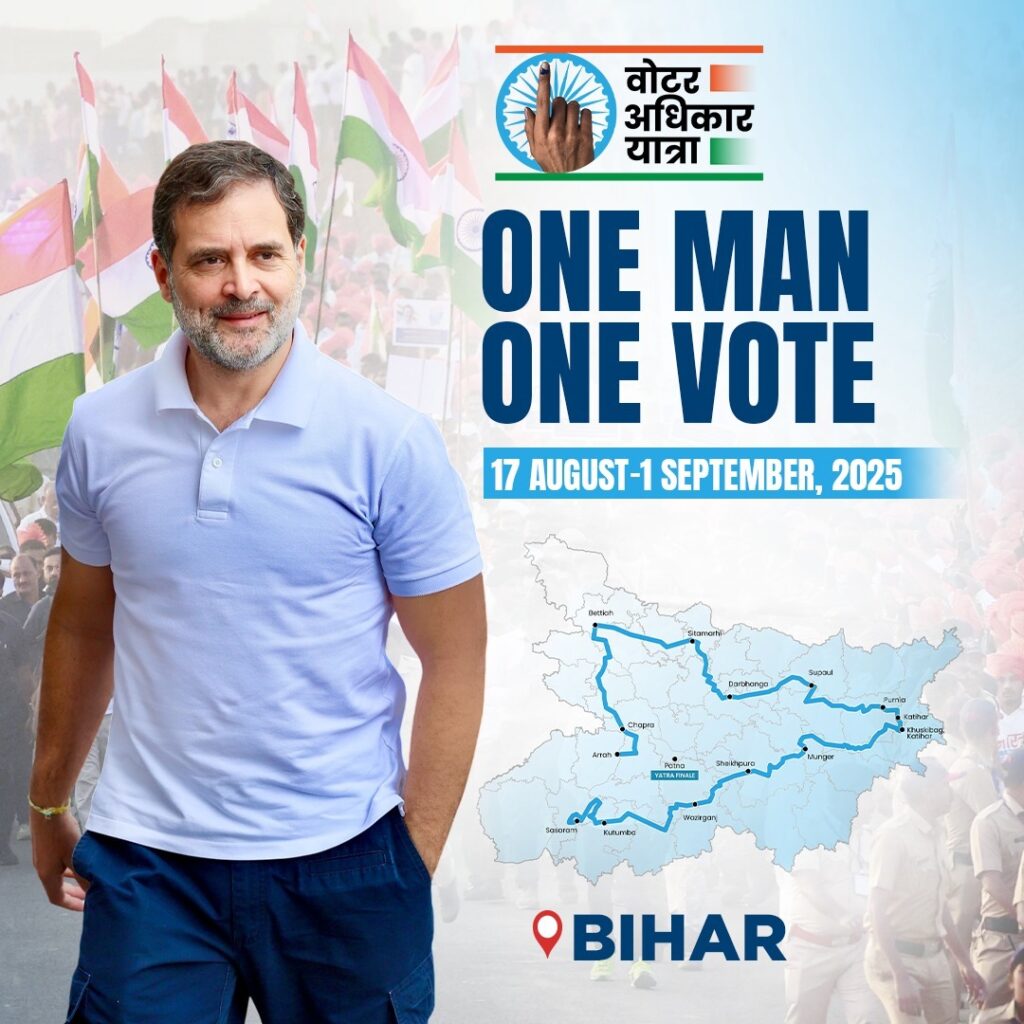
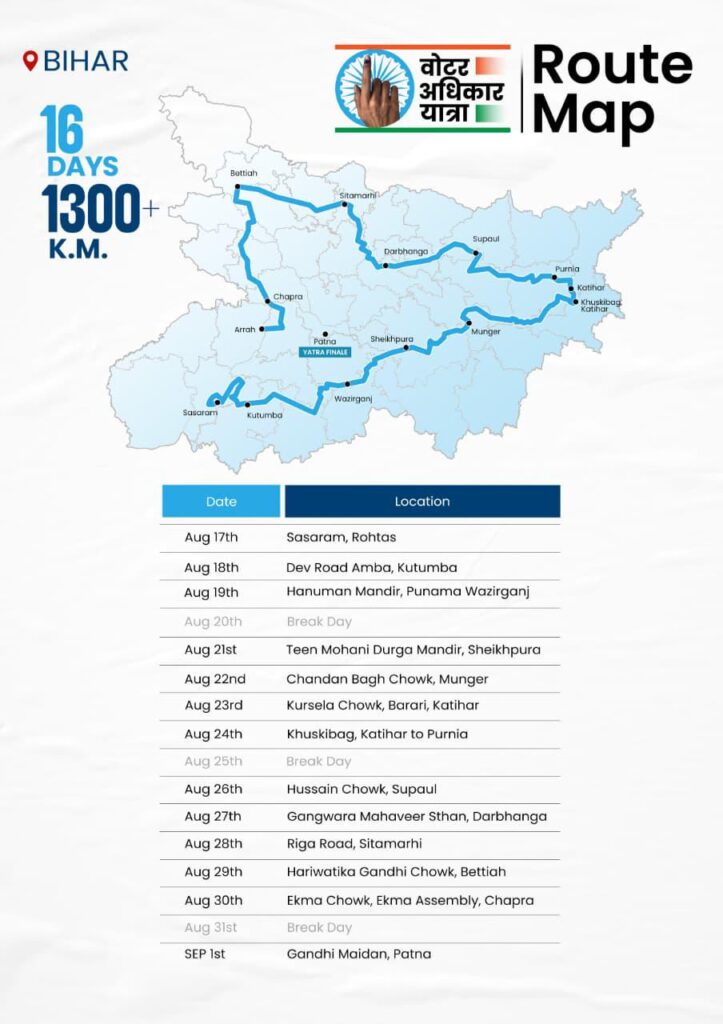
Rahul Gandhi’s ‘One Man, One Vote’ Yatra Sets Bihar Polls on Edge; BJP Silent on Nitish’s Future
New Delhi: As Bihar heads into a fiercely contested assembly election, Rahul Gandhi’s new campaign, the “One Man, One Vote Yatra,” beginning Sunday from Sasaram, has injected fresh energy into the INDIA bloc and triggered unease in the ruling NDA. The Congress leader’s sharp focus on voter rights and his consistent allegations of large-scale electoral fraud are reshaping the political discourse at a time when Chief Minister Nitish Kumar, the seasoned JD(U) leader, is visibly weakened—both politically and physically
Nitish Factor Diminishing
Unlike the last election, when Nitish Kumar led the campaign from the front, this time his fading health and reduced political clout have created a leadership vacuum in the NDA. Although the polls are formally being fought under Nitish’s leadership, the BJP’s silence on whether he will be projected again as chief minister is telling. The political message is clear: the BJP is ready to take the driver’s seat in Bihar and install its own candidate as CM, replicating its model of centralized control seen in other BJP-ruled states.
For the JD(U), this ambiguity is a setback. Nitish’s strongest support base—the OBC communities, who collectively account for about 36 percent of Bihar’s electorate—appears increasingly restless. Ground reports suggest a significant section of these voters may shift allegiance to the INDIA alliance, led by RJD and Congress, as a counter to what they see as the BJP’s creeping domination in the state.
Rahul’s Bihar Strategy
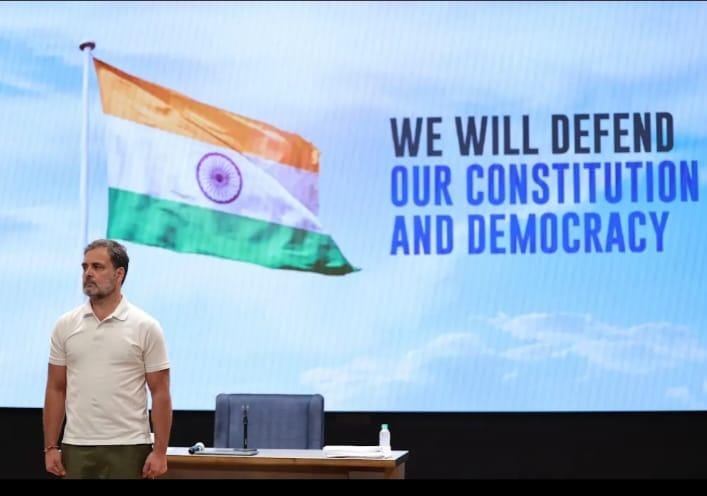
Rahul Gandhi’s Bihar outreach is not an overnight maneuver. Over the past year, he has invested in micro-level research on caste equations, voter discontent, and electoral fault lines. In a strategic move, the Congress elevated four-time MLA Rajesh Ram, a Dalit leader, as the Bihar Pradesh Congress Committee president. Ram’s appointment has energized Dalit voters and resonated with marginalized castes, giving the Congress a fresh edge in the state.
This repositioning, combined with RJD’s strong organizational presence under Tejashwi Yadav, has set the stage for a direct confrontation with the BJP-led alliance. The joint campaigns—beginning with Rahul and Tejashwi’s agitation march in Sasaram tomorrow—aim to mobilize masses around the theme of #VoteChori (stolen votes), directly attacking the credibility of the Election Commission of India (ECI).
Exposing the ‘Fake Voter’ Scandal
For the last one and a half years, Rahul Gandhi has been relentless in spotlighting what he calls “the biggest scandal in Indian electoral history.” He has repeatedly alleged that the ECI has aided the BJP by padding electoral rolls with fake voters and suppressing data. His most explosive revelation came earlier this year when he exposed alleged irregularities in the Bengaluru Central Lok Sabha seat.
According to Rahul, while the ECI tried to withhold digital data, subsequent analysis of the records—once converted into accessible formats—showed glaring discrepancies, indicating large-scale rigging. These claims have rattled the Commission, which is already under Supreme Court scrutiny over the deletion of nearly 65 lakh names from Bihar’s voter list.
The timing of Rahul’s renewed push is politically significant. By aligning his campaign with the broader INDIA bloc’s agitation against the ECI, he has merged local grievances with a national narrative of democratic erosion under the Modi government.
The Election Commission of India appears to have drifted from its constitutional mandate, behaving less like an impartial guardian of democracy and more like a body hostile to the opposition. Such conduct is unacceptable, as the Commission is not a private agency at the service of any ruling party, least of all the BJP. Its role is to safeguard free and fair elections, not to undermine them. Against this backdrop, the #VoterAdhikarYatra emerges as a legitimate democratic movement. In fact, it is overdue by nearly five years, reflecting the urgent need to restore trust in electoral processes.
INDIA Bloc Gains Momentum
Opposition parties have already displayed unprecedented unity in Parliament, where their collective strength has managed to stall key government moves. Their recent protest march against the ECI in New Delhi marked a turning point, highlighting how electoral integrity has become the fulcrum of the opposition’s strategy against the BJP.
In Bihar, this unity could prove decisive. RJD’s deep grassroots networks, Congress’s rejuvenated Dalit outreach, and Left parties’ cadre base form a formidable coalition. The emotional connect of Tejashwi Yadav with youth and backward caste groups adds to the INDIA bloc’s appeal, especially as Nitish Kumar recedes from active campaign frontlines.
Politics in Unknown Territory
What makes this election different is the shifting political grammar. Rahul Gandhi’s campaign is not just about Bihar—it is about reframing the idea of Indian democracy. By focusing on the principle of “one man, one vote,” he is drawing attention to the constitutional promise of equality, fairness, and representation.
Bihar, historically a laboratory of social justice politics, is once again at the centre of a national experiment. The question is whether the INDIA alliance can translate voter discontent into electoral victory or whether the BJP’s organizational might and strategic manoeuvring will neutralize the opposition’s momentum.
Either way, politics in Bihar—and indeed India—has entered uncharted territory. For the first time in years, the BJP faces a rival narrative that directly challenges its dominance, not just electorally but morally. Rahul Gandhi’s yatra, amplified by Tejashwi Yadav’s grassroots connect, could well become the turning point in Bihar’s political history.
[Writer is a Senior Journalist and Political Commentator]
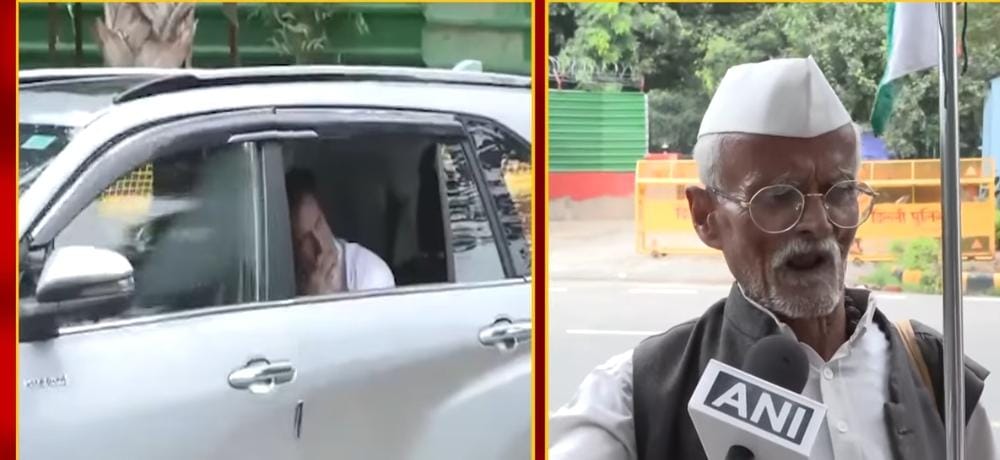
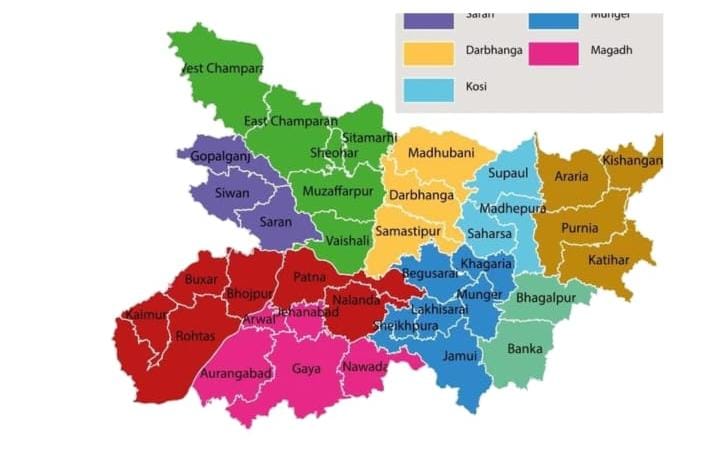
THE OLD CONGRESS MAN WISH RAHUL GANDHI FOR YATRA





